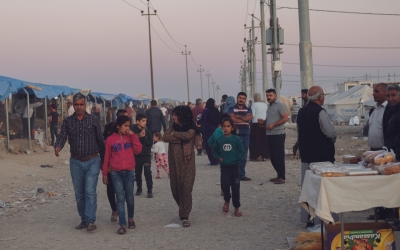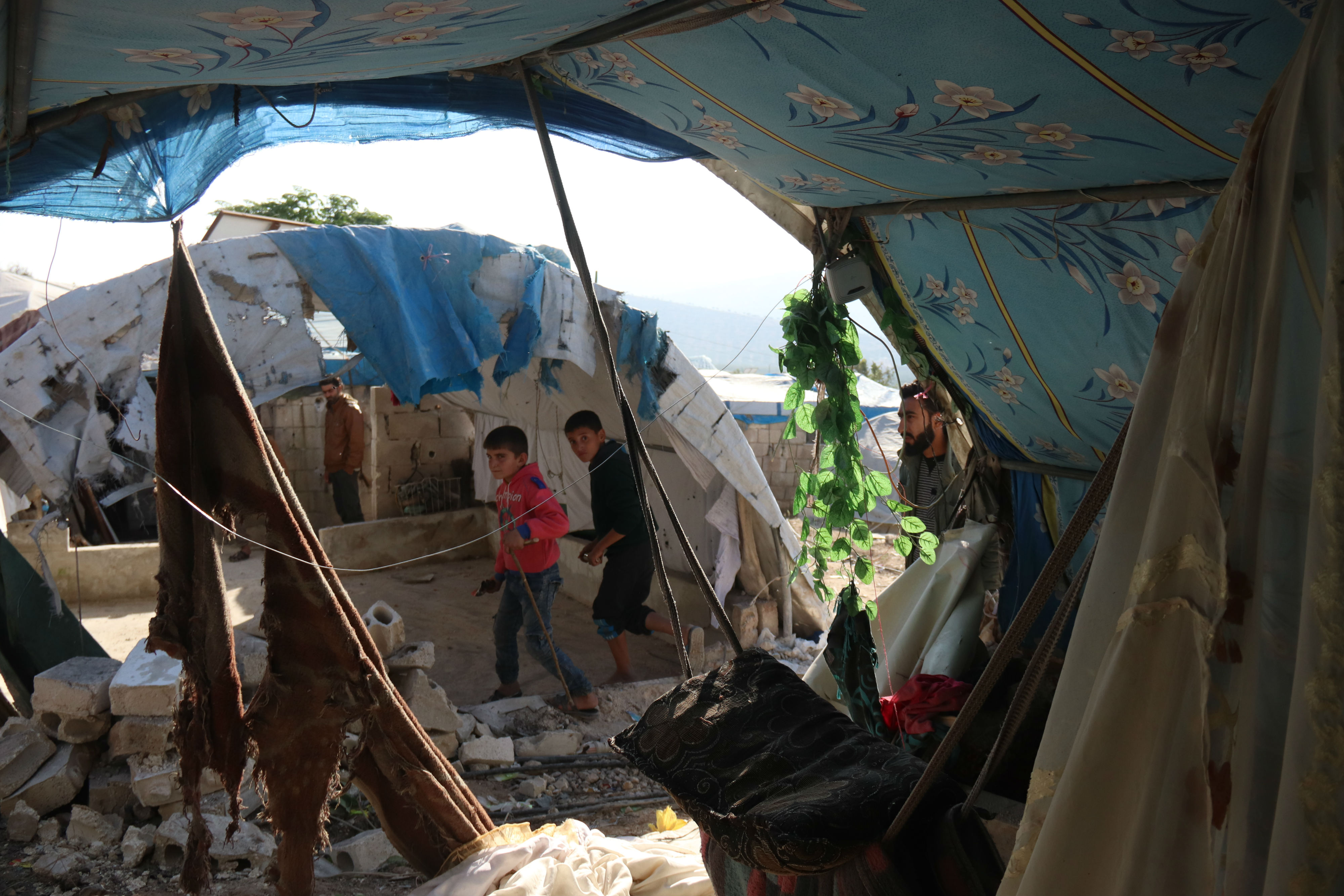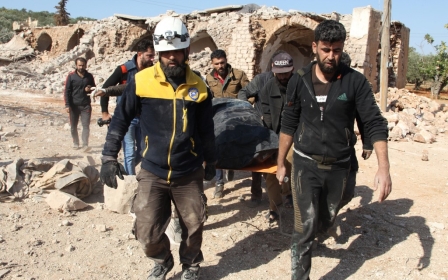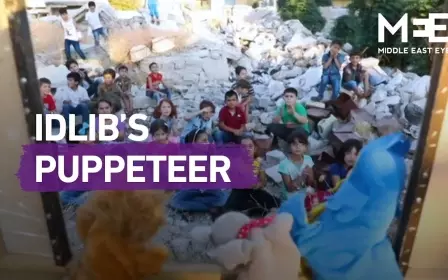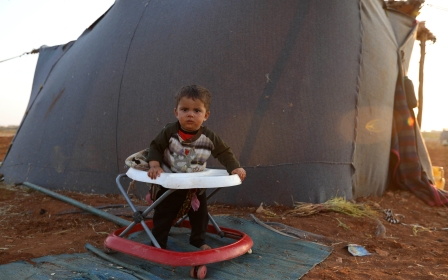Several children killed in rocket attack on Syrian camp
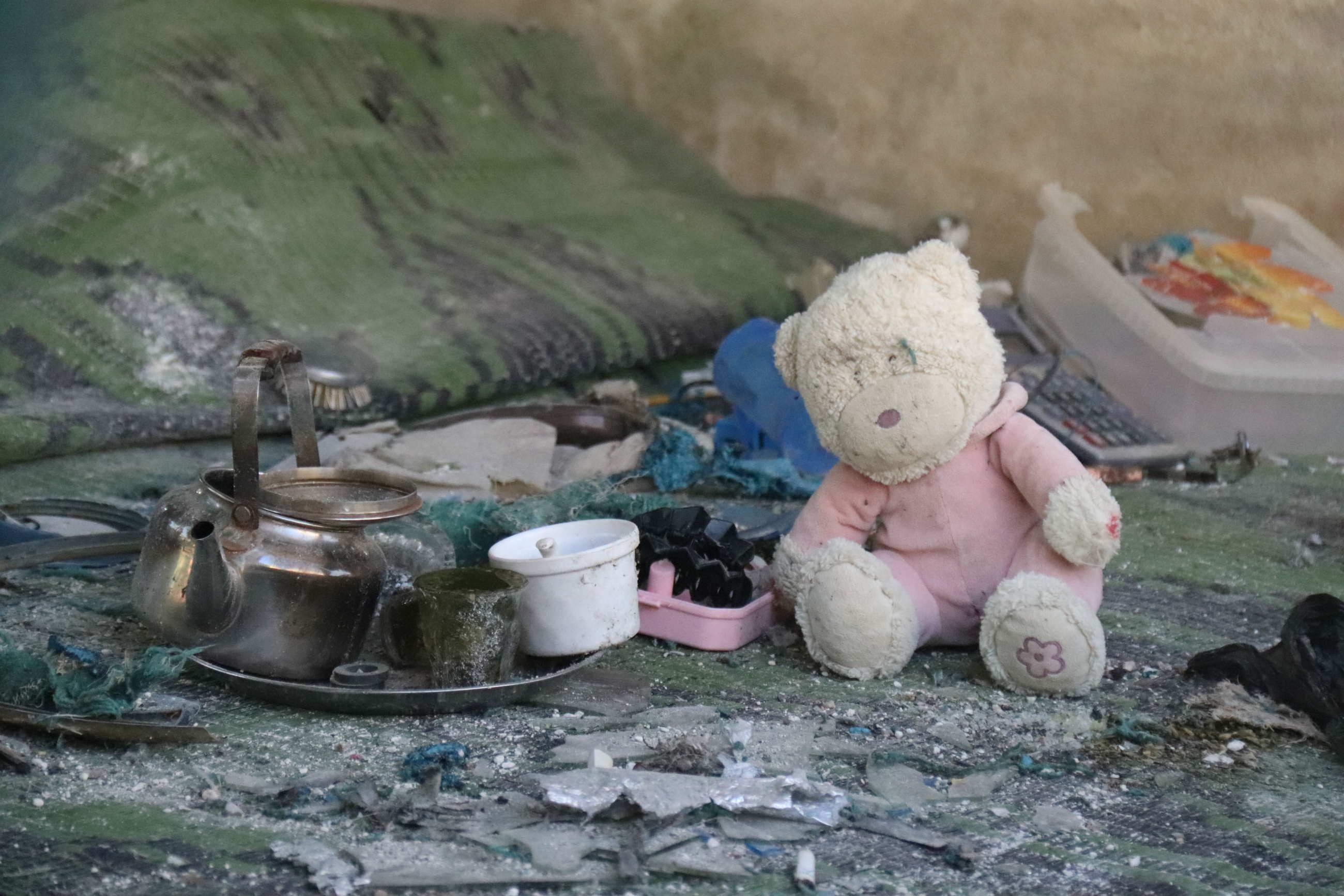
At least 12 people are dead and dozens more wounded after a missile allegedly carrying cluster munitions ripped through a crowded displacement camp in Syria’s Qah, just steps from the Turkish border, on Wednesday night.
Nearby residents, who helped evacuate the camp in northwest Syria’s Idlib province, told Middle East Eye of tents burning late into the night and dozens of casualties.
Following the attack, a video emerged of toddlers being treated for wounds on the floor of the Qah maternity hospital, which lies next to the camp. MEE understands that several children are among the dead and wounded.
An ambulance nurse working for a nearby women and children’s hospital said he helped transport several children wounded by shrapnel after the missile struck.
“Shrapnel in their eyes, shrapnel in their abdomens,” the nurse Ammar Abu Ali told MEE by phone. He requested his family name not be published, to protect relatives living in government-held territory.
New MEE newsletter: Jerusalem Dispatch
Sign up to get the latest insights and analysis on Israel-Palestine, alongside Turkey Unpacked and other MEE newsletters
Bloodiest day
The attack, which came just hours after several people were killed by bombings in the southern Idlib city of Maarat al-Numan, marks one of the bloodiest days since Syrian government and Russian forces ramped up a bombardment campaign on the rebel-held province in late April.
More than 1,000 people have been killed in that time, according to a United Nations count.
Among them now are at least seven children who had been living in Qah, according to a death count shared with Middle East Eye late on Wednesday by the Civil Defense.
Those who could flee the camp searched for shelter in the nearby town, residents said.
“When the bomb happened, everyone got very scared and scattered,” Maher al-Faouri, who lives in a house just outside the camp, told MEE. “There were people who took shelter under the olive trees, some who fled elsewhere.”
He said he helped transport women and children to the outskirts of the camp after the bomb hit.
“People right now are looking for any building that they can take shelter in. They don’t know if there will be another bombing.”
Obeida Abu Bakr told MEE on Wednesday night he was hosting three families from the camp in his home nearby, after helping evacuate residents from their tents.
He isn’t sure how long they will need to stay with him.
'People right now are looking for any building that they can take shelter in. They don’t know if there will be another bombing'
- Maher al-Faouri, Qah resident
“I have 16 or 17 people, mostly women and children,” he said. “However long they need to stay with me, they can stay.”
One of Abu Bakr’s guests, a 19-year-old man displaced from southern Idlib, said on Wednesday night he was still in shock.
“The shell hit the middle of the camp,” he said, taking the phone from his host. “We went outside, and there were many wounded people, and people who had been killed.”
After years of military advances by pro-government forces, Idlib province remains the last major area of rebel control.
There, some three million people live in increasingly dire conditions, many of them having already been forcibly displaced from former opposition-held areas of the country that came under renewed government control.
Since pro-Syrian government forces’ stepped up its bombing campaign seven months ago, hundreds of thousands of people have been displaced, many of them taking shelter in makeshift camps and rental homes close to the Turkish border.
Hospital damaged
The Qah maternity hospital, which was at the centre of Wednesday night's attack, sustained considerable damage.
Photos of the emergency room showed debris and bloodstains covering the floor, and smashed windows.
The hospital had previously been located in the town of Tarmala in Idlib’s war-ravaged south, and was put out of service by an attack in May.
With its medical staff and former patients displaced north, the hospital reopened in Qah a few weeks ago, according to the facility’s administrative director and an official from the Syrian American Medical Society (SAMS), which provides funding.
The hospital’s coordinates had been included on a UN list of “deconflicted” medical facilities shared with warring parties, including Russia, SAMS said in a statement late Wednesday night.
That list is meant to prevent attacks on hospitals. Nevertheless, there have been some 65 raids on dozens of facilities across Idlib since the bombardment began in late April, by SAMS’ latest count, devastating local healthcare.
Among the targeted hospitals are dozens, like the Qah facility, that shared their coordinates as part of the UN deconfliction mechanism.
By Thursday morning, the hospital’s administrative director Muhammad Sukkar was preparing to return to the hospital to survey the damage, and begin repairs.
Sukkar is displaced from southern Idlib and lives in the Qah camp with his family. On Wednesday night he spent the night in the ruined camp after everyone else fled, so he could help treat the wounded and visit the hospital the next morning.
“The windows of the hospital were damaged and the doors broken,” Sukkar told MEE. “Thank God, the damage is only surface-level.”
Baby incubators that once serviced infants in the camp were transferred to another facility, he said, while female staff were evacuated from the hospital shortly after the attack.
‘We thought the border area would be safer’
Wednesday’s bombing in Qah marks a rare attack on areas adjacent to the Turkish border. The brunt of bombardment has so far been felt in southern Idlib, where pro-government forces have pummelled hospitals, crowded local markets and homes.
“This strike that we saw in the Qah displacement camp diverges from the pattern that we observed in recent months,” said Elizabeth Tsurkov, an analyst at the Foreign Policy Research Institute thinktank.
'This strike that we saw in the Qah displacement camp diverges from the pattern that we observed in recent months'
- Elizabeth Tsurkov, analyst
“But it is very much in line with the larger pattern of violence throughout the war of bombing population centres, of bombing displacement camps, of bombing civilian targets.”
For those living in Qah, the attack came as a shock. Many having fled the south, they hadn’t expected to be bombed so close to the Turkish border.
“I thought that when we left Tarmala and went to the border area, it would be safer. An area that wouldn’t be bombed,” Sukkar told MEE on Thursday morning.
“So I was surprised about the catastrophe that happened last night. I’m shocked by what happened.”
“This is just a camp,” he added. “The roofs in some cases are just plastic, they don’t protect anyone from bombs.”
Middle East Eye delivers independent and unrivalled coverage and analysis of the Middle East, North Africa and beyond. To learn more about republishing this content and the associated fees, please fill out this form. More about MEE can be found here.


